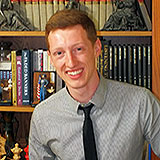Vanderbilt graduate student Darren Tinker has selected by NASA for its 2016 class of Space Technology Research Fellows.

Tinker is a second year graduate student in mechanical engineering. His research – An Additively Manufactured Torch Igniter for Liquid Propellants – is funded up to $74,000 for one year, but the award may be renewed for up to three additional years.
The coupling of additive manufacturing and liquid fuel propulsion systems is the next great advancement for space technology and will help ensure that spaceflight remains safe, affordable and sustainable.
Under the NASA fellowship, Tinker will design a 3D-printed torch igniter that is hypothesized to act as a suitable replacement for igniters machined out of wrought metal stock.
NASA recently has built and tested 3D printed injectors and thrusters, but they have either been ignited with a hypergolic propellant or a traditionally-machined torch igniter, Tinker said.
“An additively manufactured igniter could be printed directly into the injector system, which would reduce the part quantity and complexity. Validation of a printed device provides a low-cost, quickly-manufactured device using state-of-the-art manufacturing capabilities without diminishing overall engine performance,” Tinker said.
“Explicitly, the ability to additively manufacture the igniter reduces part counts, manufacturing time, and weld joints. The part and welding reduction would inherently raise device reliability. This is critical for main engine ignition and offers the ability for multiple ignition events,” he said.
Aerospace applications alone range from small in-space thrusters to torch igniters used in core-stage engines that have thrust capabilities similar to the space shuttle main engine. The proposed work will address both current and future needs for reliable ignition systems in terrestrial and space systems.
“A successful proof-of-concept would provide a foundation of knowledge to build upon and design simplifications, reducing both the cost and complexity of propulsion systems for years to follow,” Tinker said.
Tinker will work with his faculty adviser Robert Pitz, professor of mechanical engineering and chair of the mechanical engineering department, and with Robin Osborne, a senior mechanical engineer in the Combustion Devices Design and Development Branch, in the Engineering Directorate of ERC, Inc./Jacobs-ESSSA Group, at NASA’s Marshall Space Flight Center in Huntsville, Alabama.
Contact:
Brenda Ellis, (615) 343-6314
Brenda.Ellis@Vanderbilt.edu
Twitter @VUEngineering